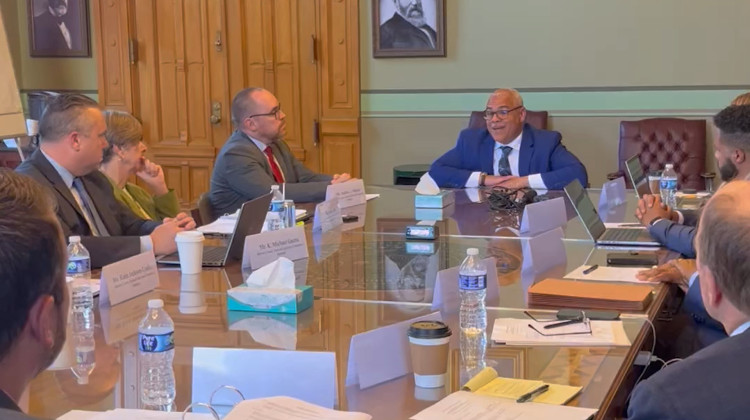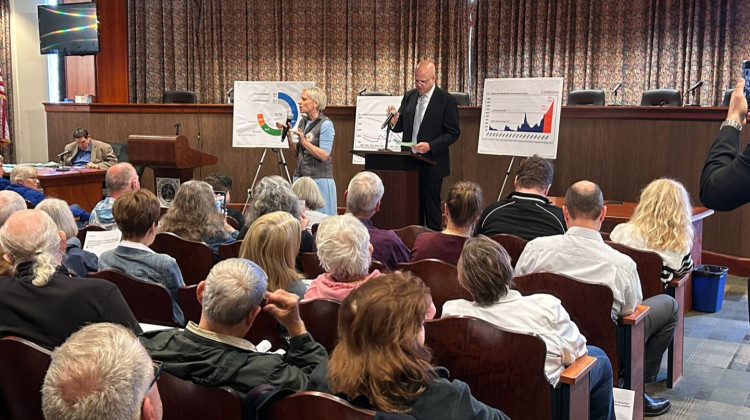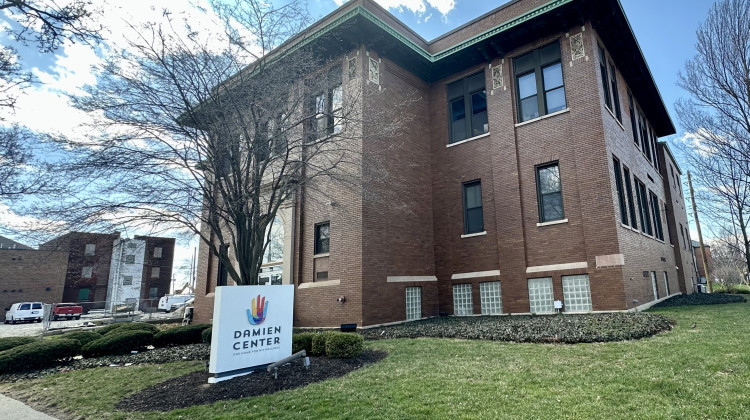
The Marion County Judicial Selection Committee interviewed justices this past summer.
Jill Sheridan / WFYIIf you're a voter in Marion County, you likely know the candidates for president in the 2024 General Election. But you might not know the 18 judges who will be on the ballot for the Marion County Superior Court.
It's difficult to be informed about judges up for retention, in part because Indiana law forbids judges from campaigning like most political candidates can.
This guide aims to help you better understand the ‘Yes’ or ‘No’ vote on judge retention you'll see on your ballot.
Judicial retention process
Judges on the Marion County Superior Court normally serve six-year terms on the bench. However, if a judge takes over for another judge in the middle of their term, the newly appointed judge’s term only lasts until the previous judge would have next been up for retention. For example, one of the judges on the ballot this year was just appointed in February, but already standing for retention.
If a majority of voters decide ‘Yes’ on retention, the judge is retained. It is very uncommon for a judge on a ballot in Indiana to receive a ‘No’ vote on retention. Indiana is one of 19 states to use these so-called retention races in some capacity.
MORE: Voters retain all 18 Marion County Superior Court judges
When a judge is first up for retention, they must undergo an interview with the Marion County Judicial Selection Committee. The committee decides whether or not to recommend them for retention. All 18 were recommended this year.
If a judge has already passed a retention election before, they are not required to stand before the Judicial Selection Committee for an interview, though they still have the option to. In this election, 16 judges were interviewed by the selection committee. Two of them, Linda Brown and William Nelson, chose not to be interviewed.
But the judges up for retention must still be approved by the voters of Marion County.
Judicial appointment
With the current system, voters decide whether to retain judges, but they do not vote judges onto the bench initially. When a vacancy occurs, those interested in the position apply for it. Right now there are two open trial court positions. 27 judges have applied in Marion County.
The 14-member Judicial Selection Committee interviews the candidates. The committee chooses its top three candidates and sends them to the governor. The governor then chooses candidates to be appointed to the court.
This process has changed somewhat in recent years. In 2017, the previous so-called slating system was ruled unconstitutional by the District Court for the Southern District of Indiana. The old process mandated an equal number of Republicans and Democrats serve on the bench. Each party nominated its candidates, and the parties never ran against each other. Supporters said it made the process less political, but critics said it disenfranchised voters.
Who’s on the ballot?
Below are all 18 judges on the ballot, along with their retention recommendation rating from the Indianapolis Bar Association. IndyBar conducted a survey of nearly 4,000 lawyers in Marion County asking whether each judge should be retained, and they required lawyers to confirm they’d had direct professional contact with the judge before answering. The retention rating is the percentage of respondents who answered ‘Yes,’ meaning they should be retained.
Retention ratings for the judges vary. IndyBar said there are several reasons for this. Some judges who were appointed to the bench more recently haven’t had as many years to interact with and build trust with attorneys. The nature of being a judge also means that in every case they rule on, their decision will please one side’s attorney and displease the other. Some survey results could reflect attorneys expressing their dissatisfaction with rulings they disagreed with.
IndyBar said that in general, judges who have served longer have higher ratings because they have more history interacting with attorneys, who later remember favorable decisions the judge made in their cases and vote 'Yes' on recommending.
Linda Brown (Criminal division)
Brown has been on the bench for 12 years. 81.4 percent of voters voted yes on retention for her in 2018. She received a law degree from the McKinney School of Law at Indiana University and has been practicing law in Indiana since 1991.
Retention rating: 81.18 percent
Charnette Garner (Criminal division)
Garner has been on the bench for six years and this is her first time up for retention. She was appointed by Governor Holcomb in 2018 following the retirement of Michael Keele. She earned her law degree from the Missouri School of Law in 2002 and has been practicing law in Indiana since 2004. Prior to her appointment, she served as chief counsel for the Marion County’s Prosecutors’ Office from 2015-18.
Retention rating: 88.55 percent
Danielle Gaughan (Criminal division)
Gaughan has been a judge for the Superior Court since she was appointed in 2022. Governor Holcomb appointed her after Mark Jones’ resignation. Prior to her appointment, Gaughan served as magistrate judge in the family court division of the Superior Court. She began working there as a judicial officer in 2002. Prior to that, she was an attorney and supervisor with the Marion County Public Defender Agency. She received a law degree from the McKinney School of Law in 1984.
Retention rating: 90.15 percent
Clayton Graham (Criminal division)
Graham has been serving on the Superior Court for 12 years. 74.8 percent voted yes on retention for him in 2018. He received his law degree from the Howard University School of Law and has been practicing law in Indiana since 1981.
Retention rating: 71.77 percent
Jennifer Harrison (Criminal division)
Harrison has been in her role for six years. She was appointed by Governor Holcomb to fill the vacancy from the retirement of Becky Pierson-Tracy. She earned a law degree from the McKinney School of Law at IU in 2008.
Retention rating: 90.43 percent
Amy Jones (Criminal division)
Jones has been serving on the Superior Court since 2012. 80.4 percent of voters approved her retention in 2018. Before joining the court, she managed her own private practice. She earned a degree from Cooley Law School at Western Michigan University in 2000 and has been practicing law in Indiana since 2001.
Retention Rating: 84.62 percent
Helen Marchal (Criminal division)
Marchal has been a judge on the Superior Court since 2012. 78.9 percent of voters approved her retention in 2018. Prior to joining the Superior Court, she served as chief of staff for the Marion County Prosecutor’s Office for twelve years. She received a law degree from the McKinney School of Law at IU in 1996.
Retention rating: 95.71 percent
Jeffery Marchal (Criminal division)
Marchal has been on the Superior Court since 2022, when he was appointed by Governor Holcomb following the retirement of Grant Hawkins. Before being appointed, Marchal served as a magistrate and master commissioner for the Superior Court, where he has worked as a judicial officer since 2004. He received a law degree from the McKinney School of Law in 1994.
Retention rating: 96.24 percent
William Nelson (Criminal division)
Nelson has been serving on the Superior Court since his election in 2000. Before that, he worked for six years as a judge on the Marion County Small Claims Court. 74.1 percent of voters approved his retention in 2018. He received a law degree from the McKinney School of Law in 1984. In 2016, he applied to become Donald Trump’s Director of the Office of National Drug Control Policy, though he was not appointed to the position.
Retention rating: 79.81 percent
Cynthia Oetjen (Criminal division)
Governor Holcomb appointed Oetjen to the Superior Court in 2021 after the retirement of Lisa Borges. Before being appointed, Oetjen had worked as a deputy prosecutor in the Marion County Prosecutor’s Office since 2003. She also previously worked as the Executive Director of the Child Advocacy Center. She earned a degree in law from the McKinney School of Law at IU in 2003.
Retention rating: 91.40 percent
Clark Rogers (Criminal division)
Rogers has been a judge on the Superior Court for 12 years. 74 percent of voters approved his retention in 2018. He received a law degree from the University of Dayton School of Law and has been practicing law in Indiana since 1989.
Retention rating: 77.32 percent
Jose Salinas (Criminal division)
Salinas has served on the Superior Court since being elected in 2006. In 2018, 79 percent of voters approved his retention. He earned a law degree from the McKinney School of Law at IU in 1997. He also previously worked as a probation officer for four years.
Retention rating: 74.61 percent
Charles Miller (Criminal division)
Miller has served on the Superior Court since his appointment to replace Steven Eichholtz in 2023. He was appointed to the Parole Board in 2013 and has been the vice chair there since 2017. From 2018 to 2021, he worked as pro bono legal counsel for Fostering the Future Now, a non-profit that helps older foster children once they turn 18. Miller also served as a deputy prosecutor for the Marion County Prosecutor’s Office for over eight years. He received a degree from the McKinney School of Law at IU in 2005.
Retention rating: 67.86 percent
John Chavis (Civil division)
Chavis was elected to the bench in 2012 and served as Presiding Judge of the Superior Court from 2015 to 2016. 75.3 percent of voters approved his retention in 2018. He also served as Associate Presiding Judge of the court’s Executive Committee and as a member of the court’s Family Operations Subcommittee. He is given credit for redrafting the court’s local rules. He earned a degree from the Florida State University College of Law in 1993 and has been practicing law in Indiana since 1994.
Retention rating: 90.71 percent
James Joven (Civil division)
Joven has served on the Superior Court since 2012. In 2018, 72.9 percent of voters approved his retention on the court. He previously served as a master commissioner for the Marion County Superior Court from 2011 to 2012, as a judge for the Lawrence Township Small Claims Court from 2006 to 2011, as a state securities commissioner from 2003 to 2005, and as a deputy attorney general with the Office of the Attorney General of Indiana from 2001 to 2003. He has also worked in private practice. He received a degree from the Maurer School of Law at IU in 1992 and has been practicing law in Indiana since then.
Retention rating: 85.05 percent
Marie Kern (Family division)
Kern has served on the Superior Court since her appointment in February 2024 to replace the retiring Heather Welch. Before being appointed, Kern had worked as a magistrate for the court since 2020. She previously presided as a magistrate in the Paternity Division of the Superior Court and was appointed Chief Magistrate of the Paternity Division in 2015. She also served as an attorney for the Marion County Public Defender Agency from 1998 to 2008 and owned her own private practice from 2001 to 2008. She earned a degree from the McKinney School of Law at IU in 1998 and has been practicing law in Indiana since then.
Retention rating: 86.31 percent
Stephen Creason (Family division)
Creason has served on the Superior Court since his appointment in 2023. Before being appointed, he worked as a magistrate judge in the Marion County Circuit Court. Prior to that, he spent 22 years working in the Indiana Attorney General’s office in a variety of roles. Creason received a degree from the McKinney School of Law at IU in 2000.
Retention rating: 88.29 percent
Alicia Gooden (Family division)
Gooden has been a judge on the Superior Court since her appointment by former Governor Mike Pence in 2015 following the elevation of Robert Altice to the Indiana Court of Appeals. She is given credit for helping to create the Family Division in Marion County. Before joining the court, Gooden worked as a master commissioner for the Marion County Circuit Court’s Paternity Court from 2001 to 2010. She also previously worked as a family law mediator, arbitrator, and parenting coordinator with The Mediation Group, and as an attorney for the Marion County Public Defender Agency. She earned a degree from the McKinney School of Law at IU in 1996.
Retention rating: 90.67 percent
Supreme and Court of Appeals
Indiana voters will also see Indiana Supreme Court and Court of Appeals judges on their ballot. There are three supreme court and two appellate judges for voters to decide to retain. The Supreme Court judges up for retention are Loretta Rush, Christopher Goff, and Derek Molter. The appellate judges are Rudolph Pyle and Peter Foley.
While the judge retention question usually comes without challenges, there is a current social media campaign to urge people vote no on three Supreme Court justices because of their ruling on Indiana's new abortion law. You can read Indiana Citizen's reporting here, on that move and the pushback from legal professionals across the state to leave the bench intact.
Judges on the Ballot in 2026
There will be more judges on the ballot in 2026. Several judges on the Marion County Small Claims Courts will be up for election or reelection. Each township in Marion County has its own small claims court, and judges in that court are picked through partisan elections, not retention elections.
Small claims court allows any citizen to bring a case seeking damages less than $10,000. Residents do not need an attorney in small claims court. The judges decide on cases involving eviction, personal injury, property damage and money owed.
Small claims judges serve four-year terms and then must be re-elected if they wish to serve another term. There will be one judge for each of the nine townships elected in 2026.
Community Engagement Specialist Bailey Schwartz contributed to this report.
 DONATE
DONATE






 Support WFYI. We can't do it without you.
Support WFYI. We can't do it without you.